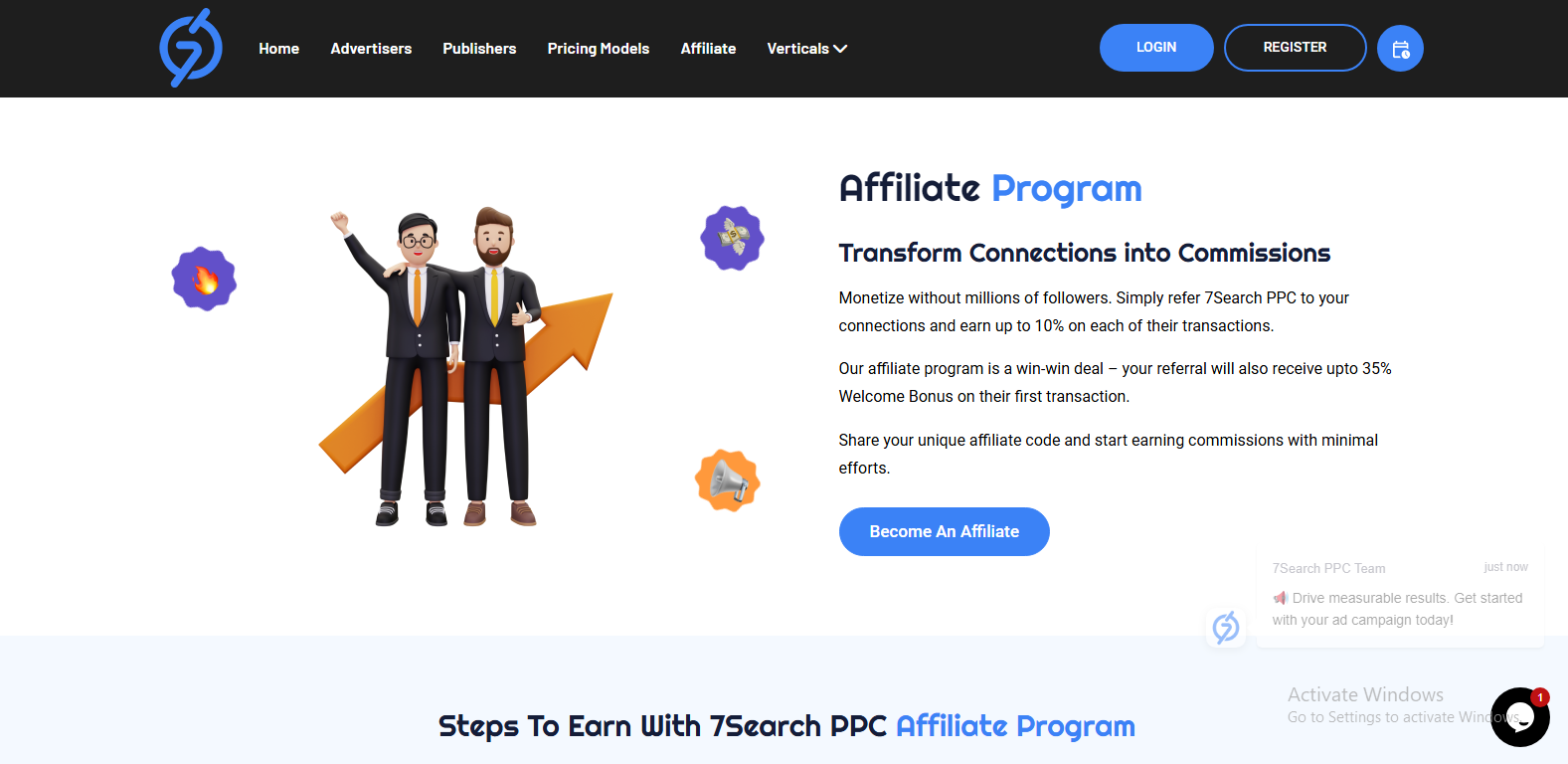PPC (Pay-Per-Click) affiliate marketing is a powerful strategy for individuals and businesses aiming to generate passive income or scale their online presence. By combining the precision of PPC advertising with the flexibility of affiliate marketing, this method opens doors to substantial earning potential. Whether you're a seasoned marketer or a beginner, mastering PPC affiliate marketing can significantly impact your success.
This blog explores the essentials of PPC affiliate marketing, the tools and strategies needed, and how to use affiliate marketing platforms, websites, and networks to your advantage.
Join Our Affiliate Network

Key Features of PPC Affiliate Marketing
Benefits
Essential Tools for PPC Affiliate Marketing
Mastering PPC affiliate marketing requires leveraging the right tools. Here are a few must-haves.
Affiliate Marketing Platforms
Affiliate platforms act as intermediaries between advertisers and affiliates. Popular platforms include:
To run PPC campaigns, you need access to ad platforms:
Effective tracking is crucial to monitor campaign success:
Choose the Right Affiliate Marketing Network
Affiliate marketing networks connect advertisers with affiliates and offer programs suited for PPC campaigns. Examples include:
Identify a Profitable Niche
Choosing the right niche is pivotal for PPC affiliate marketing success. Consider:
Use long-tail keywords to target specific audiences and reduce ad costs.
Set Up High-Converting Landing Pages
Your landing page is where users land after clicking your PPC ad. It must:
Running PPC campaigns effectively is an art and a science. Here's how to excel:
Optimization is a continuous process in PPC affiliate marketing. Focus on:
This blog explores the essentials of PPC affiliate marketing, the tools and strategies needed, and how to use affiliate marketing platforms, websites, and networks to your advantage.
Join Our Affiliate Network
Key Features of PPC Affiliate Marketing
- Cost Control: Marketers can set daily budgets and optimize spending.
- Targeted Audience: PPC allows precise targeting based on demographics, interests, and behavior.
- Performance Tracking: Detailed analytics to monitor ROI and campaign performance.
Benefits
- Quick Results: Unlike organic traffic strategies, PPC campaigns generate immediate traffic.
- Scalability: With optimized campaigns, scaling becomes seamless.
- Diverse Platforms: Numerous affiliate marketing platforms offer PPC-friendly programs.
- High Competition: Popular niches often have intense bidding wars.
- Learning Curve: Requires knowledge of PPC tools and affiliate marketing strategies.
- Risk of Overspending: Ineffective campaigns can drain budgets quickly.
Essential Tools for PPC Affiliate Marketing
Mastering PPC affiliate marketing requires leveraging the right tools. Here are a few must-haves.
Affiliate Marketing Platforms
Affiliate platforms act as intermediaries between advertisers and affiliates. Popular platforms include:
- ClickBank: Ideal for digital products.
- CJ Affiliate: Known for its extensive network of advertisers.
- ShareASale: Offers a mix of products and services.
To run PPC campaigns, you need access to ad platforms:
- Google Ads: Offers extensive reach and detailed analytics.
- Facebook Ads: Perfect for targeting specific demographics.
- Bing Ads: A cost-effective alternative to Google Ads.
Effective tracking is crucial to monitor campaign success:
- Voluum: A powerful tool for tracking affiliate campaigns.
- Google Analytics: Free and provides detailed traffic insights.
- ClickMeter: Simplifies link tracking for affiliate marketers.
Choose the Right Affiliate Marketing Network
Affiliate marketing networks connect advertisers with affiliates and offer programs suited for PPC campaigns. Examples include:
- Amazon Associates: Excellent for beginners.
- Rakuten Marketing: Offers premium advertisers and high commissions.
- 7Search PPC: A growing network for PPC-focused affiliate marketers.
- Relevance: Ensure the products/services align with your niche.
- Commission Rates: Opt for programs offering competitive commissions.
- Support and Tools: Networks with robust support systems and marketing tools are ideal.
Identify a Profitable Niche
Choosing the right niche is pivotal for PPC affiliate marketing success. Consider:
- Trendy Markets: Health, technology, and personal finance are evergreen options.
- Audience Demand: Use tools like Google Trends to gauge interest.
- Low Competition: Avoid oversaturated markets unless you have a unique approach.
Use long-tail keywords to target specific audiences and reduce ad costs.
Set Up High-Converting Landing Pages
Your landing page is where users land after clicking your PPC ad. It must:
- Be Relevant: Align with the ad copy to ensure consistency.
- Load Quickly: Slow pages increase bounce rates.
- Include a Call-to-Action (CTA): Encourage users to complete the desired action.
- Clear Headlines: Grab attention instantly.
- Trust Signals: Testimonials, reviews, and trust badges.
- Minimal Distractions: Keep it focused on the offer.
Running PPC campaigns effectively is an art and a science. Here's how to excel:
- Keyword Research: Tools like SEMrush and Ahrefs can identify profitable keywords.
- Ad Copy: Write compelling and concise ads that highlight benefits.
- A/B Testing: Test different versions of ads to optimize performance.
- Google Ads: Best for reaching a global audience.
- Facebook Ads: Ideal for demographic-specific targeting.
- Instagram Ads: Perfect for visually-driven niches.
Optimization is a continuous process in PPC affiliate marketing. Focus on:
- CTR (Click-Through Rate): Higher CTR indicates effective ad copy.
- Conversion Rates: Monitor the percentage of users completing desired actions.
- Cost per Conversion: Lower costs translate to better ROI.
